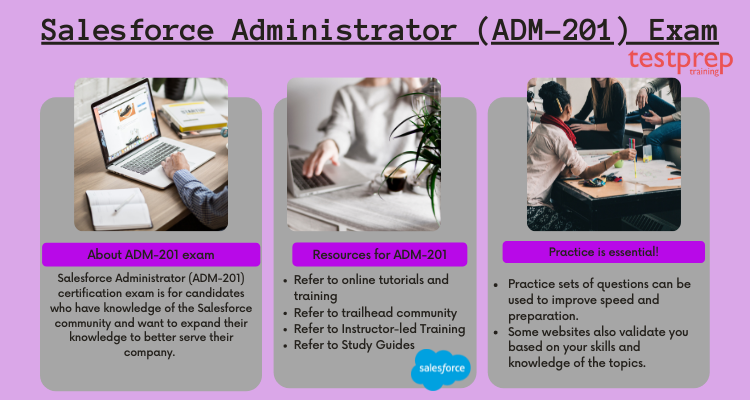Salesforce is one of the most popular and widely used customer relationship management (CRM) platforms in the world. With its vast array of features and capabilities, Salesforce has become an essential tool for businesses of all sizes. And to manage and customize this powerful platform, a skilled Salesforce administrator is required. The Salesforce Administrator certification is intended for individuals who have prior Salesforce experience and are constantly looking for ways to help their companies benefit even more from additional features and capabilities. The exam covers the breadth of applications, end-user features and functions, and administrator configuration and management options across the Sales, Service, and Collaboration Clouds. The Salesforce Certified Administrator program offers two certifications:
- The first is the Salesforce Certified Administrator, which focuses on the capabilities and functionality needed to keep a Salesforce deployment functioning well.
- The Salesforce Certified Advanced Administrator is the program’s second certification.
Further, this credential is intended for the Salesforce Certified Administrator who has mastered Salesforce configuration maintenance, can demonstrate an understanding of administration best practices, and can use advanced features and functionality to solve a wide range of business problems.
To become a certified Salesforce Administrator, one must pass the ADM-201 exam. But just how difficult is this exam? In this blog post, we will explore the various aspects of the ADM-201 exam, including its format, content, and difficulty level. Whether you’re planning to take the exam or simply curious about what it entails, this post will provide you with valuable insights and information to help you prepare for success.
Glossary for Salesforce Administrator (ADM-201) Exam
- Account: A customer or organization that a company does business with.
- Apex: A programming language used to develop custom code for the Salesforce platform.
- Apex Trigger: A piece of code that executes before or after specific events occur on a record in Salesforce.
- AppExchange: A marketplace for Salesforce apps and components.
- Batch Apex: A feature used to process large amounts of data in Salesforce.
- Chatter: Salesforce’s collaboration tool that allows users to share information, files, and updates.
- Community: An online portal that allows companies to interact with customers, partners, and employees.
- Custom Object: A custom data object created by a Salesforce Administrator to store specific information.
- Dashboard: A visual representation of data from Salesforce reports.
- Field: A specific piece of information stored on a record in Salesforce.
- Lightning Experience: A user interface introduced in Salesforce that is more modern and intuitive.
- Opportunity: A potential sale or deal with a customer or organization.
- Page Layout: The arrangement of fields, buttons, and related lists on a record in Salesforce.
- Permission Set: A collection of permissions that can be assigned to a user or group of users.
- Profile: A set of permissions and settings that define what a user can see and do in Salesforce.
- Report: A summary of data in Salesforce that can be customized and filtered.
- Salesforce Mobile App: A mobile application for accessing Salesforce data and functionality.
- Sandbox: A separate environment for testing and development in Salesforce.
- Sharing Rule: A rule that defines how records can be shared with other users or groups in Salesforce.
- Workflow: An automated process in Salesforce that performs a specific action when certain conditions are met.
Exam preparation resources for Salesforce Administrator (ADM-201) Exam
There are several resources available online for preparing for the Salesforce Administrator (ADM-201) Exam. Here are some of the most recommended ones:
- Salesforce Trailhead: This is a free, interactive learning platform created by Salesforce. It provides various modules, trials, and projects for ADM-201 exam preparation. Here’s the link: https://trailhead.salesforce.com/en/home
- Salesforce Certification Study Groups: These are groups of people who are preparing for the ADM-201 exam. You can join these groups to learn from other people’s experiences and share your own. Here’s the link: https://trailblazer.salesforce.com/_groups/certification-study-groups
- Salesforce Certification Exam Guide: This is an official exam guide by Salesforce. It covers all the topics that are included in the ADM-201 exam. Here’s the link: https://www.salesforce.com/content/dam/web/en_us/www/documents/datasheets/DS_Salesforce-Certified-Administrator-Exam-Guide.pdf
- Salesforce Administrator Certification Practice Exams: These are online practice exams that simulate the real ADM-201 exam. They help you assess your readiness for the exam and identify areas for improvement. Here’s the link: https://www.salesforce.com/products/salesforce-courses/exam-prep/administrator-exam-prep/
Salesforce Administrator Exam Outline
The Salesforce administrator exam guide is a good place to start for exam preparation. This section provides a list of topics and sub-topics to help you understand the concepts. The Salesforce Administrator exam, on the other hand, will assess the candidate’s abilities in the following areas:
Configuration and Setup: 20%
- Describe the information found in the company settings (for example: company settings fiscal year, business hours, currency management, default settings).
- Distinguish and understand the administration of declarative configuration of the User Interface. (for example: UI settings, app menu, list views, global actions, Lightning App Builder).
- Given a scenario, demonstrate the proper setup and maintenance of users.
- Explain the various organization Security Controls. (for example: Setup Audit Trail, Login Hours, Session Settings)
- Given a user request scenario, apply the appropriate security controls based on the features and capabilities of the Salesforce sharing model. (for example: public groups, org wide default, sharing: roles, subordinates, hierarchy, report and dashboard folders)
- Given a scenario, determine the appropriate use of a custom profile or permission set using the various profile settings and permissions.
Object Manager and Lightning App Builder: 20%
- Describe the standard object architecture and relationship model. (for example: standard object, parent/child, master detail/lookup/junction relationships, and record types.)
- Explain how to create, delete, and customize fields and page layouts on standard and custom objects, and know the implications of deleting fields.
- Given a scenario, determine how to create and assign page layouts, record types and business processes for custom and standard objects.
Sales and Marketing Applications: 12%
- Given a scenario, identify the capabilities and implications of the sales process. (for example: sales process, opportunity, path, and forecast impact.)
- Given a scenario, apply the appropriate sales productivity features using opportunity tools. (for example: dashboards, lead scoring, Einstein opportunity scoring, and home page assistant.)
- Describe the capabilities of lead automation tools and campaign management. (for example: leads, lead convert, lead assignment rules, campaign and campaign members.)
Service and Support Applications: 11%
- Describe the capabilities of case management. (for example: case, case assignment rules, and queues.)
- Given a scenario, identify how to automate case management. (for example: support process, case auto-response rules, and case escalation.)
Productivity and Collaboration: 7%
- Describe the capabilities of activity management.
- Describe the features of Chatter.
- Describe the capabilities of Salesforce Mobile App.
- Identify use cases for AppExchange applications.
Data and Analytics Management: 14%
- Describe the considerations when importing, updating, transferring, mass deleting, exporting and backing up data.
- Describe the capabilities and implications of data validation tools.
- Describe the options available when creating or customizing a report or report type.
- Describe the impact of the sharing model on reports.
- Describe the options available when creating and modifying dashboards (e.g., dashboard components, data sources, chart types, Subscribing, running user).
Workflow/Process Automation: 16%
- Given a scenario, identify the appropriate automation solution based on the capabilities of the tool.
- Describe capabilities and use cases for Flow.
- Describe capabilities and use cases for the approval process.
you can find more documentation, by searching with the name of the module at the official site of the trailhead.
Let us now move on to the main point of this article.
How difficult is the Salesforce Administrator (ADM-201) Exam?
When we consider the difficulty of the test, it clearly varies from person to person. It is determined by a number of factors, including study resources, work experience, learning style, test-taking attitude, and, perhaps most importantly, how much preparation they have done for the test. As previously stated, self-evaluation will help you determine whether you are skilled or not. Most importantly, self-evaluation will assist you in identifying areas of weakness, and the practice exam will assist you in improving your answering skills.
Since the passing score for the Salesforce Administrator Exam is 65% and above, it clearly indicates that you would require in-depth knowledge and understanding required to pass this exam. Moreover, The exam consists of 60 multiple-choice questions, so you must answer at least 39 correctly to pass.
Let’s now look at some important resources that will help you to ace the exam in one go!
Salesforce Administrator (ADM-201) Study Guide
There are numerous preparation resources available, but you should select the best ones if you want to pass the exam with flying colours. Make certain that the resources you select are content-reliable and provide you with plenty of practice as well as a strong conceptual understanding of the topics. You can use the following resources:

1. Books for Salesforce Administrator Exam

Books are, without a doubt, the first resource that comes to mind when preparing for any type of exam. They are easily accessible, and we select books based on our preferences. Depending on your level of understanding, you can consult a variety of books available in online stores, bookstores, and libraries. Make certain that the books are reliable in terms of content and that they cover all of the topics mentioned in the Salesforce administrator exam syllabus outline. You can consult the following Salesforce administrator books:
- Salesforce Advanced Administrator Certification Guide: Become a Certified Advanced Salesforce Administrator with this exam guide
- Moreover, Salesforce CRM – The Definitive Admin Handbook: Build, configure, and customize Salesforce CRM and mobile solutions, 5th Edition
2. Trailblazer community – Online community
The online community is the best place to ask exam-related questions. There is no better guide than an experienced person, so don’t be afraid to ask your exam-related questions. You can also inquire about the people’s study strategies and other exam-related resources. Trailblazer community- this is an official Salesforce community, so it is one of the reliable sources.
3. Online classes and instructor-led courses
- There are a plethora of websites that are reliable in terms of giving online lessons and instructor-led training from world-class instructors. These instructors have extensive expertise of the subject and can assist in developing a conceptual understanding and dispelling misconceptions.
Salesforce also offers its own Salesforce administrator online training courses, which are listed below-
- Firstly, Trailmix: Prepare for Your Salesforce Administrator Credential
- Additionally, Trail: Study for the Administrator Certification Exam
- Furthermore, Superbadge: Lightning Experience Reports & Dashboards Specialist
- Moreover, Superbadge: Business Administration Specialist
- Also, Superbadge: Security Specialist
The expert-led courses recommended for this exam include:
- Firstly, Administration Essentials for New Admins (ADM-201)
- Secondly, Administration Essentials for New Administrators in Lightning Experience and Certification (ADX-201C)
- Thirdly, Preparing for Your Salesforce Administrator Certification (CRT-101)
- Also, Administrative Essentials for New Admins in Lightning Experience (ADX-201)
- Then, Lightning Experience Administrative Essentials for New Admins (ADX-201E)
- Lastly, Trailhead Virtual Bootcamp for New Admins (SPP201)
4. Salesforce Administrator (ADM-201) Practice Tests
To pass the exam, you must practice extensively after you have completed the curriculum preparation. You must guarantee that you have got enough practice because the exam is not easy. Salesforce administrator practice exams can help you find areas where you need to improve your preparation. Furthermore, these tests are designed to mimic the conditions of a genuine exam. You can enhance your speed and accuracy, as well as your confidence, by taking many tests. Attempt a free Salesforce administrator practice test to self-evaluate your preparations!
Expert Corner
You can use the Salesforce administrator study guide, books, online training, and instructor-led training to help you. All you have to remember is that practice is the only way to improve your understanding of concepts. Make certain that the resources you select are content-reliable and provide you with plenty of practice as well as a strong conceptual understanding of the topics.






